
- Home
- India
- World
- Premium
- THE FEDERAL SPECIAL
- Analysis
- States
- Perspective
- Videos
- Sports
- Education
- Entertainment
- Elections
- Features
- Health
- Business
- Series
- In memoriam: Sheikh Mujibur Rahman
- Bishnoi's Men
- NEET TANGLE
- Economy Series
- Earth Day
- Kashmir’s Frozen Turbulence
- India@75
- The legend of Ramjanmabhoomi
- Liberalisation@30
- How to tame a dragon
- Celebrating biodiversity
- Farm Matters
- 50 days of solitude
- Bringing Migrants Home
- Budget 2020
- Jharkhand Votes
- The Federal Investigates
- The Federal Impact
- Vanishing Sand
- Gandhi @ 150
- Andhra Today
- Field report
- Operation Gulmarg
- Pandemic @1 Mn in India
- The Federal Year-End
- The Zero Year
- Science
- Brand studio
- Newsletter
- Elections 2024
- Events
- Home
- IndiaIndia
- World
- Analysis
- StatesStates
- PerspectivePerspective
- VideosVideos
- Sports
- Education
- Entertainment
- ElectionsElections
- Features
- Health
- BusinessBusiness
- Premium
- Loading...
Premium - Events
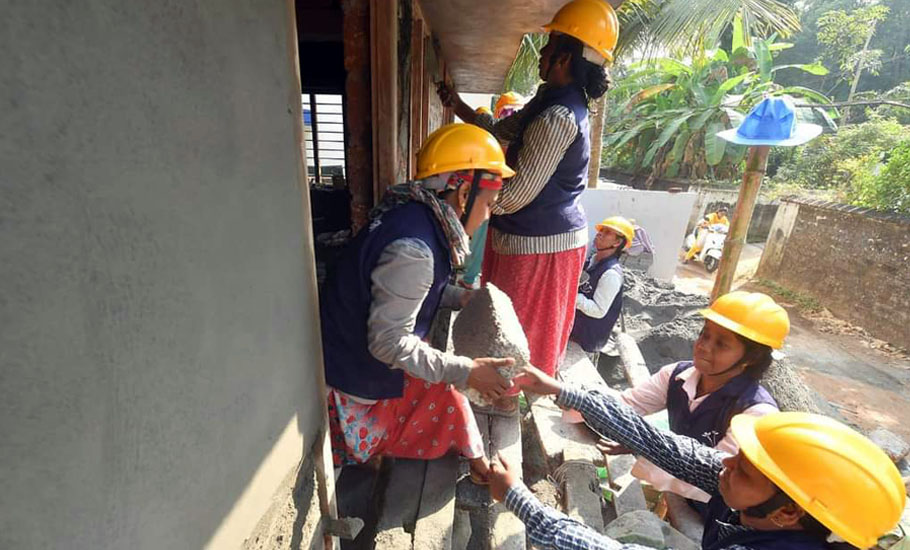
From e-com to building homes and more, an all-woman team in Kerala is smashing stereotypes
Kudumbasree, the Kerala government’s ambitious poverty eradication mission, was launched in 1998 by helping women form neighbourhood groups and engage in employment opportunities.

When Beena and a team of 8 women reached Piravam in Kerala’s Ernakulum district sometime around 2015, their task of building houses for poor tribal people atop a hill was not only an unusual challenge but an arduous one too. The state tribal department had contracted them for building 97 houses on 7 acres of barren land that had no electricity or water or even a road connecting the place to...
When Beena and a team of 8 women reached Piravam in Kerala’s Ernakulum district sometime around 2015, their task of building houses for poor tribal people atop a hill was not only an unusual challenge but an arduous one too.
The state tribal department had contracted them for building 97 houses on 7 acres of barren land that had no electricity or water or even a road connecting the place to a city or a town.
With a budget of ₹2.5 lakh for each house of 360 sqft, they would need to put more than just the normal efforts. But they did not give up.
“It was our call. We had to take it and we had to prove what we were capable of, there was no choice,” says Beena.
They reworked and submitted an alternate plan for 87 houses, but this would include a play area, a community hall and small space for a market.
“The most important thing was that people needed a road wide enough at least for an ambulance. We also suggested making concrete roofing instead of tiles to ensure security for women and girls,” she says.
In six months, they handed over 9 houses and in two years, they finished 30 houses.
Building homes has largely been considered to be men’s domain. But Beena and the 40 home builders broke traditions when they got training in designing and constructing houses and buildings.
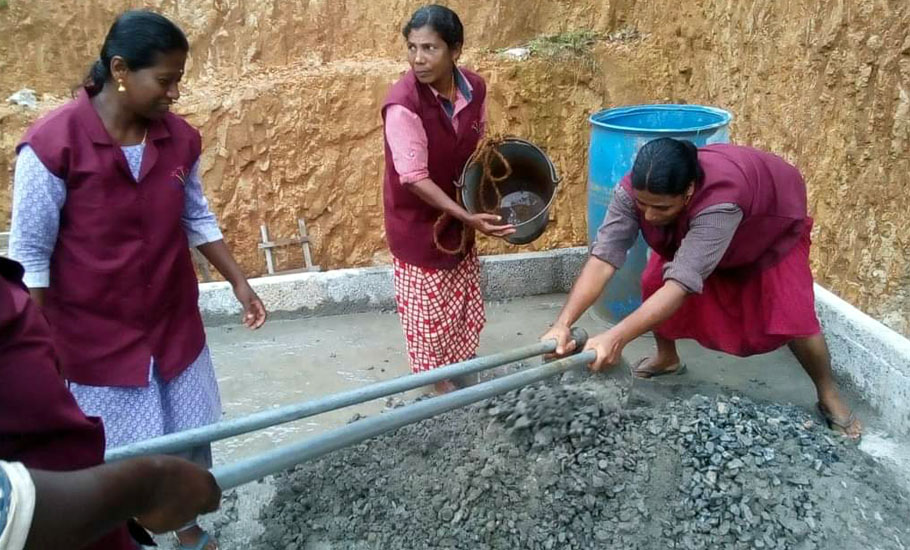
“When Kudumbasree thought about bringing women into this field, there were lot of women who showed interest. Thus the first batch was selected in 2014. HUDCO (Housing and Urban Development Corporation) gave us 90 days training,” recollects Beena, who has a Diploma in Draughtsman Civil course from an Industrial Training Institute.
Even after completing the course, no one offered them a job until the state tribal department did.
Kudumbasree scheme
But breaking age-old traditions and norms would not have been possible without Kudumbasree, the Kerala government’s ambitious poverty eradication mission launched in 1998 by helping women form neighbourhood groups and engage in employment opportunities.
The massive devolution of funds from the Centre and the state through the local self-government to these women through a micro-financing programme — small loans at low interest rates to run small enterprises — has led to Kudumbashree to become the largest women’s collective in Asia with over 45 lakh members. Kudumbasree has also explored the option of taking loans from public sector banks at a low interest rate.
The programme has a three-tier structure with Neighbourhood Groups (NHGs) at the lowest level, Area Development Societies (ADS) at the middle, and Community Development Societies (CDS) at the top, attached to local self-government.
By March 31, 2019, Kudumbasree network had 2.91 lakh NHGs affiliated to 19,489 ADSs and 1,064 CDSs with a total membership of 43,93,579 women. The membership is open to all adult women and limited to one membership per family.
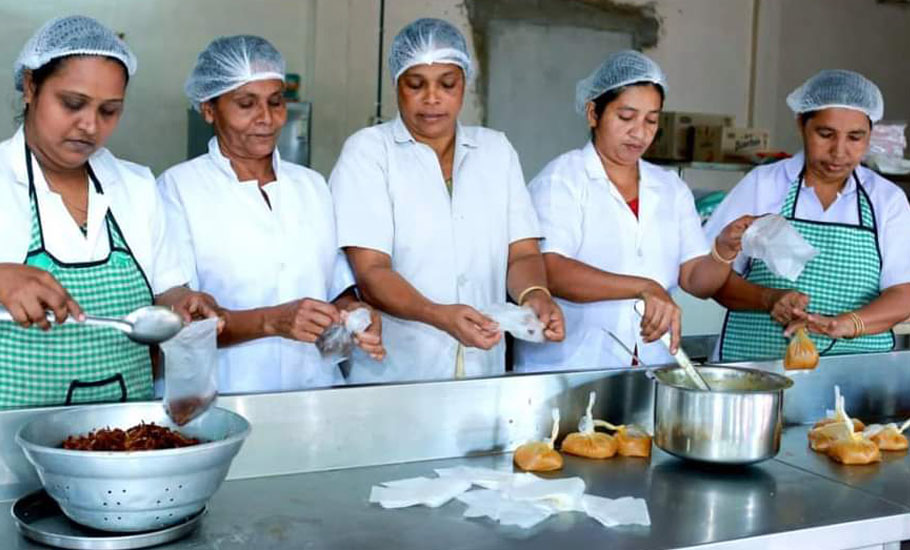
As many as 26,448 micro enterprises have been successfully run by Kudumbasree women in Kerala. Around five lakh members have been engaged in farming collectively and individually under various schemes of Kudumbasree.
In addition to these, there are community kitchens, home shops, kiosks, digital marketing, health clubs, food on wheels, home stays, trade fairs, capacity building programmes, occupational trainings and so on. Kudumbasree also runs palliative care, community counselling, gender training, children’s collectives, sanitation programmes, etc.
Breaking stereotypes
In the early years, Kudumbasree was criticised for promoting gender stereotypes by running enterprises such as pickle-making units, stitching centres, garment units, sanitation and so on.
Over the years, Kudumbasree has broken these by taking up tasks that had been perceived to be men’s. Lakhs of women have engaged in self-employment and entrepreneurship individually and collectively. Like Beena and her colleagues, there are 273 construction groups under Kudumbasree across the state.
Anybody travelling across the state would not miss the Kudumbasree hotels, canteens and cafes. The women wearing cream kurti with a coffee brown overcoat have become the symbol of quality food, hygiene, reasonable price and hospitality. There are 848 eateries run by Kudumbasree where a meal is available at a rate of ₹20.
One would find the Kudumbasree women while travelling on train too. From managing paid parking at 49 railway stations and waiting halls of five stations, they have now even taken over ticketing, customer facilitation and housekeeping services at Kochi Metro, which Hari Kishore, the executive director of Kudumbasree, says is a unique model.
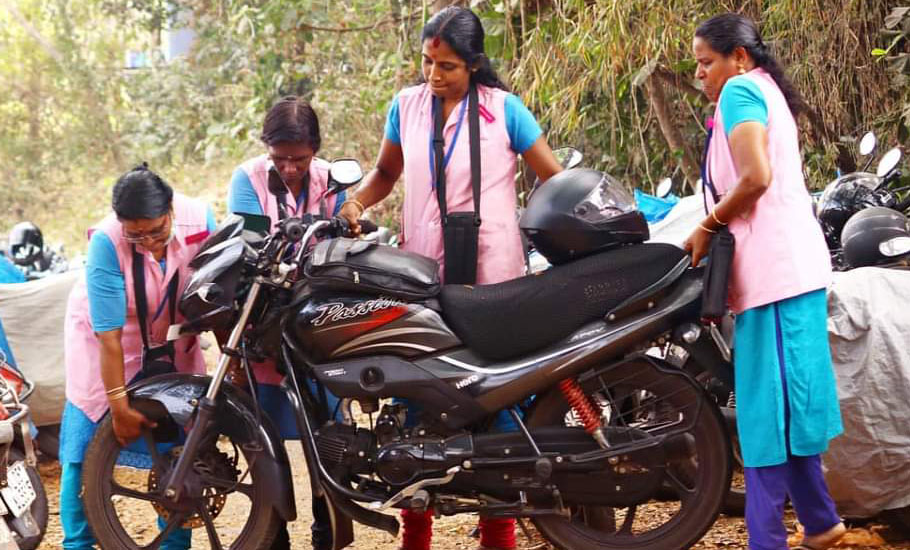
“The London Metro was started in 1863, the latest is Nagpur Metro that began in 2019. Kochi Metro is the only one managed and run entirely by women and that of a single collective, our Kudumbasree,” says Hari Kishore.
650 women of Kudumbasree have been engaged as full timers in Kochi Metro.
Match-making
Kudumbasree Matrimony is yet another innovative scheme running successfully, which in addition to offering matchmaking services, also ensures verification of people.
Sindu Balan, director of Kudumbasree Matrimony, says it all began when she came across a young woman who was cheated by a man who fled with her money and gold after a fake marriage.
“I was working as the chairperson of the CDS (in Porkkulam Panchayat in Thrissur District) then. Later we found that he had done similar fake marriages three times before and had stolen the money and gold. This happened because the bride’s family had no way to crosscheck and verify whether the information furnished by the groom was factual or not,” she says.
Kudumbasree Matrimony came into being in 2016. The registration is free for girls. Men who have graduation and above have to pay ₹1,500 and others ₹750.
“We want to send out a message to the society that women should be valued and respected when it comes to marriage. Getting married is not the need of women only. Besides, none of the girls registering in our matrimony wants to get married to a boy who is not at par with her in education. Hence we provide a subsidised rate for under graduate boys,” she says.
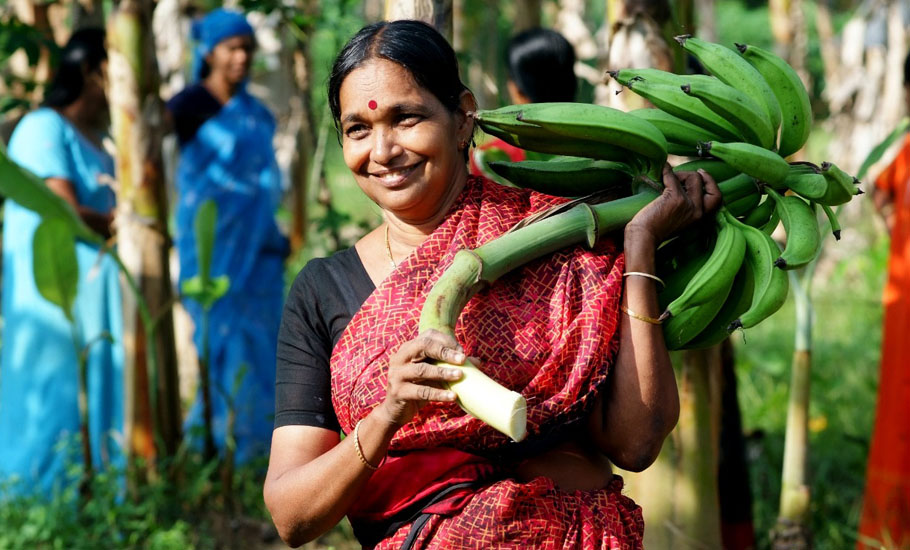
An average of 10-15 marriages take place every month through Kudumbasree Matrimony, according to Sindhu.
They use their massive local network across the state to collect and verify information about both the families.
Kudumbasree’s own Swiggy, Zomato, Amazon
Finding the right mix of marketing has been a challenge for the Kudumbasree network. And so was born Kudumbasreebazar.com.
“755 products made by 240 Kudumbasree entrepreneurs are available on this platform,” says Hari Kishore, adding that women are fast learners when it comes to e-commerce. He calls it ‘our own Amazon’. Most of these Kudumbasree products are available on Amazon too.
Kudumbasree has also launched ‘Nano markets’ wherein its products occupy shelf spaces in big supermarkets and create a consistent consumer base as in the case of any top brand.
‘Annasree’, the online platform for food delivery is yet another venture from the group which is in the budding stage.
The credit goes to AIFRHM (Adebha Institute for Food Research and Hospitality Management), a marketing and management institute established by the Thrissur district mission of Kudumbasree. AIFRHM provides training for members across the state on running cafes, food processing and marketing management.
“Annasree was launched recently. When the entire market became dull by the lockdown, we tried to explore alternatives for our women who have been into the food and hospitality business. Thus we have launched an app for food delivery,” says Rethy, director of AIFRHM.
“Apps such as Swiggy and Zomato deliver food only in urban areas. We hope to do it in rural areas too by making use of Kudumbasree’s network.”
Kudumbasree travels (auto, taxi service) and Kudumbasree security services also have become phenomenal successes in breaking stereotypes.
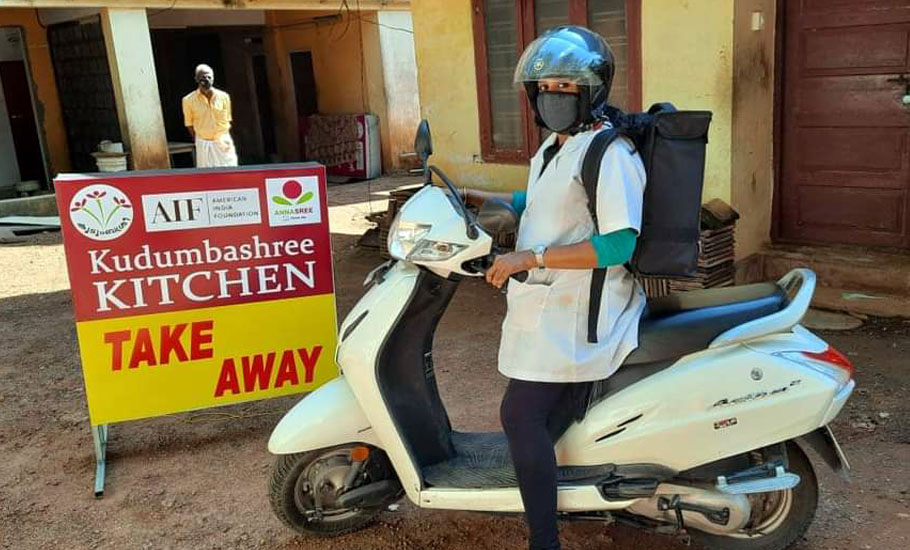
Exploring talents
Kudumbasree is not all about enterprises and business. There is a cultural and sporty side to it. The annual art festival for Kudumbasree members named ‘Arangu’ has become a platform for hundreds of women who gave up their artistic talents due to the struggles of family life and career. There are competitions for various dance forms, music, drama, painting, story writing, etc.
Kudumbasree also has 48 drum bands across 11 districts. who specialise in the unique performance called ‘Sinkari Melam’ which has become a sensation over the last few years.
The Kudumbasree members from Kuttanad in Alappuzha the won second place in the prestigious Nehru trophy boat race in 2019. 86 women participated in the trials and 36 were selected. They have been given rigorous training for three months.
“We would have won the first place. It was a strategic mistake. We did trials even on the day of the competition and everyone got exhausted,” says 45-year-old Suma Thankachan, the team leader, expressing her zeal.
Powering their way through
Kudumbasree women have also made inroads into the power blocs. One-third of the total women members elected to the local bodies in the recent election are members of Kudumbasree. 16,965 Kudumbasree members contested the election and 7,071 of them won, forming 32 per cent of the total elected women. This has been a consistent trend since 2015 in which 7300 Kudumbasree members were elected. Sindu Balan, team leader of Kudumbasree Matrimony, was fielded by CPI(M) and was elected to the Porkkulam block panchayat.
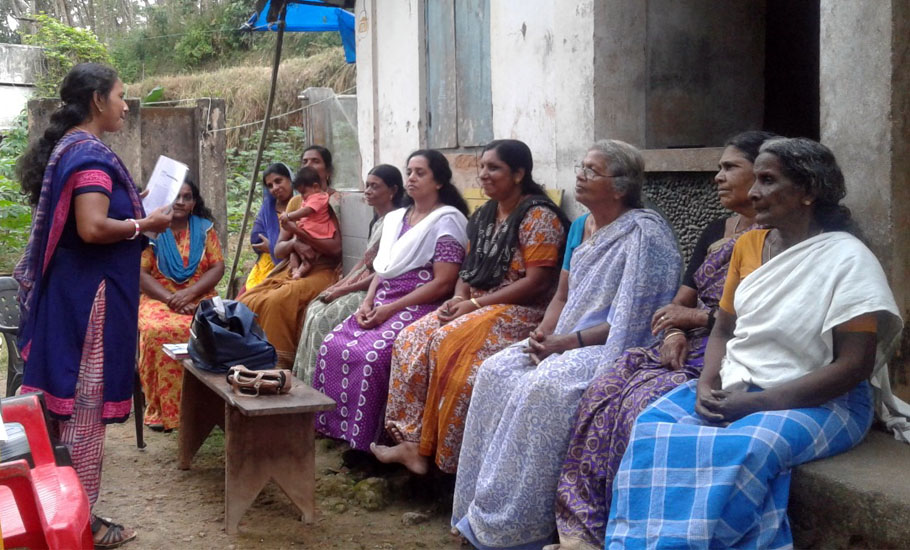
Hari Kishore recollects a conversation with Beena after the successful completion of the almost impossible construction project in Piravam.
“I asked Beena how they took up the challenge of constructing houses on a barren hill top. She said, if women are determined to do a thing, there is no question of going back.”
